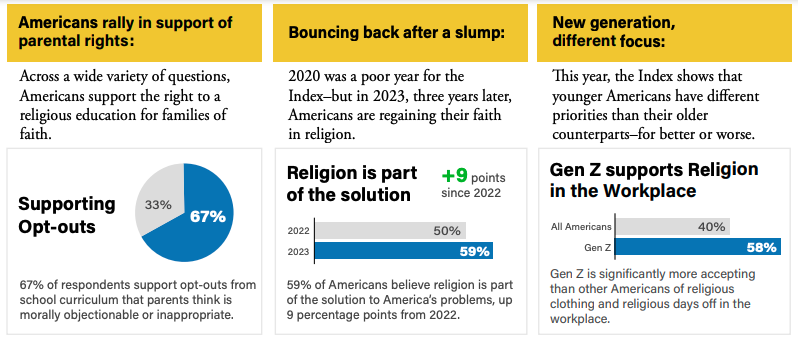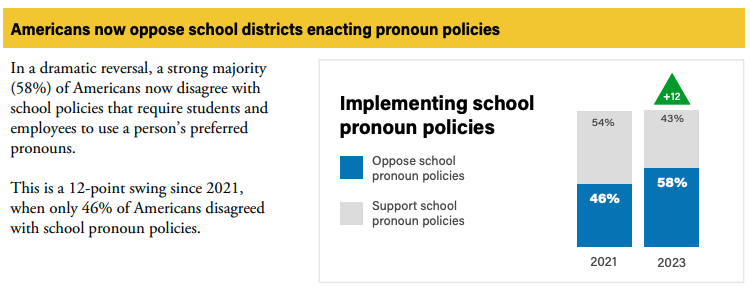A newly released report from the Becket Fund for Religious Liberty has found that Americans’ support for religious liberty remains strong.
Becket’s 2023 Religious Freedom Index: American Perspectives on the First Amendment, Fifth Edition (Index) examined Americans’ perspectives on ongoing court cases, parental rights, and how the next generation sees the role of faith in America.
“In 2023, the Index score rose to 69 – its highest score ever – and showed that despite generational differences and ideological divides, America’s commitment to religious liberty remained strong,” the report found.

The Index’s “Key Findings” in 2023 include:
- Americans rally in support of parental rights: Across a wide variety of questions, Americans support the right to a religious education for families of faith.
- Bouncing back after a slump: 2020 was a poor year for the Index – but in 2023, three years later, Americans are regaining their faith in religion.
- New generation, different focus: This year, the Index shows that younger Americans have different priorities than their older counterparts – for better or worse.
The Index found that two-thirds of Americans “support opt-outs from school curriculum that parents think is morally objectionable or inappropriate.”
Additionally, “59% of Americans believe religion is part of the solution to America’s problems, up 9 percentage points from 2022.”
The report also found that Gen Z – by a 58%-40% margin – “is significantly more accepting than other Americans of religious clothing and religious days off in the workplace.”

In one of the most encouraging findings, the Index found that a strong majority (58%) of Americans “now disagree with school policies that require students and employees to use a person’s preferred pronouns.”
“The is a 12-point swing since 2021, when only 46% of Americans disagreed with school pronoun policies,” the report states.

Becket notes that its Index is “the first annual index to track public opinion across a complete spectrum of issues related to religious freedom and provide a holistic view of the public’s opinion on these issues.”
The Index surveyed 1,000 Americans, asking them 21 Index Questions and 15+ Additional Questions to determine their beliefs on current topics.
The right to freely exercise one’s religion is an integral part of the First Amendment to the U.S. Constitution, which states,
Congress shall make no law respecting an establishment of religion, or prohibiting the free exercise thereof; or abridging the freedom of speech, or of the press; or the right of the people peaceably to assemble, and to petition the Government for a redress of grievances (emphasis added).
It’s great news that a growing number of Americans recognize the importance of religious liberty. It’s one of the main reasons the United States was founded, after all.
And yet, other surveys have warned many Americans are ignorant about their guaranteed constitutional rights.
According to the Annenberg Public Policy Center’s most recent national survey, less than half (40%) of Americans can name the “freedom of religion” as one of the rights guaranteed by the First Amendment.
On September 17, 1787, Benjamin Franklin was leaving Independence Hall in Philadelphia, Pennsylvania after the closing of the Constitutional Convention. It’s said that as he was walking out, a woman – Elizabeth Willing Powel – shouted a question to the 81-year-old Doctor Franklin.
“Well, Doctor, what have we got, a republic or a monarchy?” Powel asked.
Franklin replied, “A republic, if you can keep it.”
On January 5, 1967, then Governor Ronald Reagan gave his Inaugural Address as the new governor of California. He correctly observed,
Freedom is a fragile thing and it’s never more than one generation away from extinction. It is not ours by way of inheritance; it must be fought for and defended constantly by each generation, for it comes only once to a people. And those in world history who have known freedom and then lost it have never known it again.
We have a republic, if we can keep it.
It’s up to each new generation of Americans to learn our rights and responsibilities as citizens of our republic – and then to ensure they’re respected by our elected representatives.
Can you name all five freedoms guaranteed by the First Amendment? If not, perhaps scroll back up to the First Amendment for a quick refresher on your constitutional rights.
Related articles and resources:
The Daily Citizen: Religious Freedom
Photo from Getty Images.






